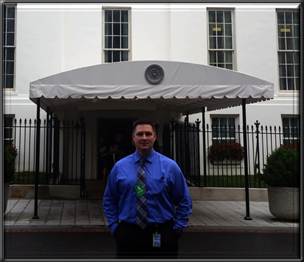 |
 |
||||||||||||||||||||||||||||||||||||||||||||||||||||
|
| |||||||||||||||||||||||||||||||||||||||||||||||||||||
By Year
By Award
|
Brian Wilson
In the Corps' Seattle District, with its sensitive ecosystems, endangered species and high degree of environmental awareness among stakeholders, the role of the Environmental Compliance and Sustainability Program Manager is a critical position. Brian Wilson, named the 2016 Environmental Compliance Employee of the Year, received the recognition for his commitment to the Corps' Environmental Compliance mission, his encyclopedic knowledge of the many regulations and laws regarding compliance and his talent for administration and motivation. The Corps first created the official Environmental Compliance function back in the mid-1990s in response to Executive Orders from the Presidential Administration related to the greening of the federal government, and funded positions to execute the order throughout the Corps' 420 projects. Wilson was hired by the Corps in 2008 initially as a Regulatory Project Manager in Eugene, Oregon. After completing Portland District's rigorous Leadership Development Program in 2011, Wilson was offered the Environmental Compliance Coordinator position with the Willamette Valley Projects and thereafter (2015) was selected for the 6-month long Environmental Compliance and Sustainability Career Assignment Program at Headquarters in Washington D.C. After returning from Headquarters, Wilson was hired by the Seattle District as the new Environmental Compliance and Sustainability Program Manager overseeing the operational programs for the District and associated hydropower and flood control Projects spanning three-states in the Pacific Northwest. Wilson's accomplishments in this role are impressive. Since the Program Manager role was relatively new and his staff had questions about many of the job's requirements, Wilson first began helping his team of ECCs for each state in the District, to establish relationships with one another. His ECCs began to seek out the advice and support of their colleagues as they navigated their technically challenging jobs. He then inaugurated quarterly meetings, and started by inviting his ECCs to the District headquarters in Seattle for meetings, a first for most of them. He also opened up channels of communications between his staff and the District's safety managers, who share dotted-line relationships. In addition, Wilson serves as one of the District's medical officers, teaching CPR/First Aid and Bloodborne Pathogens classes throughout the District and Operating Projects. Wilson recently completed a Train-the-Trainer course, and is now certified to teach and develop new instructors for delivering emergency care training programs, further bridging the relationship between environmental compliance and safety. Wilson then went on to tighten up the process of conducting annual compliance inspections at the District's six Operating facilities. Coordinators review each project's various plans, including SPCC (Spill Prevention Control and Countermeasures) plans, hazmat plans, master plans, cultural resource plans and many others, often numbering hundreds of pages. These plans are checked for accuracy and the coordinators conduct spot interviews with other staff to test their understanding of the plans and their roles in ensuring compliance. Wilson also serves as a national instructor of environmental compliance regulations and provides practical tools for conducting these inspections at Corps Operating Projects. Wilson uses his expertise and teachings to provide the Corps with the necessary tools for maintaining a healthy environmental program. Among the dozens of requirements ECCs look for are proper techniques for managing various types of waste, storing incompatible products (e.g. corrosives and flammable liquids,) proper signage for storage tanks ("No Smoking," or "No Flame",) and preparation and maintenance of safety data sheets. Each step of these inspections provides the Compliance Coordinators with insights into where the projects need help with their Environmental programs. Two areas are particularly important to the mission: Oil spill control and management, and sustainability. Wilson stages annual spill management trainings, which he coordinates with other related agencies such as the U.S. Coast Guard, local law enforcement and emergency services. These trainings take the form of practice drills, in which the agencies respond to a hypothetical spill as if it were real. Wilson leads the annual drills, in which they stretch out "boom," a system of mechanical dams that corrals surface oil to a place where it can then be recovered out of the water. To demonstrate the effectiveness of the training to the public, Wilson opens up the demonstrations to the local media, who provide positive reports on the way the Corps and other agencies have planned ahead with meticulous detail for a wide range of spill disaster contingencies. These media initiatives help show the Corps as a confident leader in disaster management. Improving the Corps' overall sustainability metrics is also highly important to Wilson, a trained Energy Manager through the Association of Energy Engineers. He analyzes and implements new ways to convert power usage from fossil fuels to solar energy and other renewable sources. He looks for ways to save water and to identify potential issues such as water leaks and line breaks. Wilson was one of the instructors for the Corps' Sustainability training program, with the first organized national training held in 2014 for the Sacramento District's rangers, managers, and environmental staff, and has recently become the National team's lead instructor. The training consisted of presenting metrics the Corps uses to track program compliance, energy and water resources, renewable energy opportunities, waste management, and green procurement regulations. The training program has continued to develop and expand with improvements prompted by student feedback and has resulted in a successful training program sought after by many Corps Districts and Divisions. This program provides focused awareness and understanding of Executive Orders and Administration guidelines for "greening" the federal government, reducing energy and water consumption, properly diverting waste, and understanding greenhouse gas emissions. Corps employees now have a structured training program to become more familiar with these regulations and learn key takeaways for implementing change at their respective Districts and Projects. |
 Item is restricted to U.S. Army Corps of Engineers, CAC required. Document will open in a new window.
Item is restricted to U.S. Army Corps of Engineers, CAC required. Document will open in a new window.
